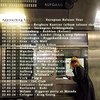Name: Mary Ocher
Nationality: Russian & Israeli
Occupation: Vocalist, Lyricist, Songwriter, Director
Current Release: Mary Ocher's Approaching Singularity: Music for The End of Time is out November 3rd 2023 via Underground Institute.
You can also catch her live in 2024 here:
Recommendations: Ooh, this is so lovely!
Book: Invisible Cities - Calvino Italo
and record: The Rubaiyat of Dorothy Ashby – Dorothy Ashby.
If you enjoyed this interview with Mary Ocher, her website is a great points of departure for finding out more about her. She is also on Instagram, and Facebook. For an even deeper dive into her thoughts, read our earlier Mary Ocher interview.
Where does the impulse to create something come from for you? What role do often-quoted sources of inspiration like dreams, other forms of art, personal relationships, politics etc play?
Whenever an idea comes I write it down. It can be a response to just about anything.
For you to get started, do there need to be concrete ideas – or what some have called a 'visualisation' of the finished work? What does the balance between planning and chance look like for you?
If we are talking about songs and albums - I never ever plan ahead, but rather follow instinct, and then examine the new bundle and see what the pieces have in common.
Then I look for images, titles and everything else that can go along with it.
Is there a preparation phase for your process? Do you require your tools to be laid out in a particular way, for example, do you need to do 'research' or create 'early versions'?
Again, if we're talking about sound, they may be early recorded versions, sometimes these even make it to the final stage.
It's not research per se, just ideas that sometimes require further polishing.
What do you start with? How difficult is that first line of text, the first note?
Starting is the easy part.
Sometimes it isn't difficult to finish either, but at other times, it can be an ongoing struggle.
To quote a question by the great Bruce Duffie: When you come up with a musical idea, have you created the idea or have you discovered the idea?
Depending on the context, sometimes it really does seem like an idea finds you, rather than vice versa.
When I was younger, deas used to come so freely, it seemed like magic at times. It was too easy, there was no struggle ...
From your experience, are there things you're doing differently than most or many other artists when it comes to writing music?
That is not for me to say, while I can describe my various methods - I can only guess how others approach writing ...
Many writers have claimed that as soon as they enter into the process, certain aspects of the narrative are out of their hands. Do you like to keep strict control or is there a sense of following things where they lead you?
That sounds like weakness to me, to “not be in control (of your own creation).“ What does that actually mean? That you have shut off your rationale and given in to your emotion, removing any analytical thinking?
No, I think it's extremely important to keep the right and the left sides of your brain in check while writing.
Emotions can lead you astray, a good piece of writing needs focus, wit and clarity. Whether it's set to music or not.
Often, while writing, new ideas and alternative roads will open themselves up, pulling and pushing the creator in a different direction. Does this happen to you, too, and how do you deal with it? What do you do with these ideas?
Contradictions create tension, which can be very healthy, as long as the multitude of narratives can be tied together.
There are many descriptions of the creative state. How would you describe it for you personally? Is there an element of spirituality to what you do?
Absolutely not. I believe in nothing magical, nothing supernatural, just the cold physicality of our existence.
Everything such as ideas will die with us (individuals), and eventually die with the human race (although in our hubris we'd certainly like to kid ourselves to believe we may be immortal and that the cosmos and all that's in it dances to our tune).
Once a piece is finished, how important is it for you to let it lie and evaluate it later on? How much improvement and refinement do you personally allow until you're satisfied with a piece? What does this process look like in practise?
I love having a deadline for releasing a record. If there is no deadline (such was the case during the pandemic), I can go over each piece again and again to no end.
It's best to finish and move on.
After finishing a piece or album and releasing something into the world, there can be a sense of emptiness. Can you relate to this – and how do you return to the state of creativity after experiencing it?
Is there an emptiness? There's always more ideas awaiting and more work to be done.
Most of the work is actually not sitting down and “arting away“, but going out into the world to play shows and do all of the beurocratic and promotional work around it - which is not glamorous at the slightest.
Music is a language, but like any language, it can lead to misunderstandings. In which way has your own work – or perhaps the work of artists you like or admire - been misunderstood? How do you deal with this?
It is communication, and I particularly enjoy it when others read into a piece something very different from my original intention ...
But it can be rather unpleasant when someone tries to purposely find clues to political agendas that are contradictory to mine - for instance a right-wing Spanish newspaper tried to find an anti-Western nationalistic angle in my 2017 record The West Against The People.
If you read the album's essay, you know it is very lefty, it questions power dynamics, hierarchies and so on ... I regret having met with the journalist, who wasted everyone's time. That article amounted to absolutely nothing, because his editor did not find the scoop they were looking for …
We've learned we ought to be very picky with the press, stay away from spoken interviews as much as possible, to avoid misunderstandings and misquotes ... the work is very sensitive and if taken out of context, it can easily lead to misunderstandings and get me into all sorts of trouble with various governments.
Creativity can reach many different corners of our lives. Do you personally feel as though writing a piece of music is inherently different from something like making a great cup of coffee? What do you express through music that you couldn't or wouldn't in more 'mundane' tasks?
Writing comes as naturally as making a cup of coffee, only that I don't think I can make a really good cup of coffee.
There's probably lots of people out there who are better at that … but perhaps not as many people who can write a decent song.





